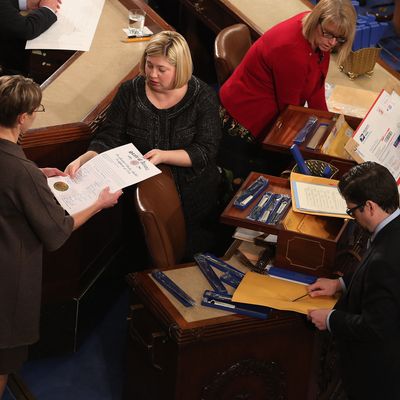
You might think Republicans would be entirely satisfied with an Electoral College system that has twice in the last five elections elevated a fellow party-member to the presidency despite a loss in the national popular vote. But GOP legislators in Virginia and Minnesota are reviving pre-2016 legislation designed to emulate Maine and Nebraska in awarding Electoral College votes by congressional district rather than statewide vote totals. The ostensible rationale for these proposals is to provide representation in the Electoral College for regions that are outvoted at the state level by urban areas like Northern Virginia. But it’s really a hobbyhorse for state lawmakers who control states the other party typically carries at the presidential level.
Indeed, Virginia toyed with such legislation shortly after the 2012 elections, along with Michigan, Ohio, Pennsylvania, and Wisconsin. What these states had in common at the time was Republican “trifecta” control of state governments in states that had voted for Barack Obama over Mitt Romney. Not coincidentally, such a system would have awarded the presidency to Romney, who won 226 House districts against Obama’s 209 (Romney also won 28 states to Obama’s 22, which under the system Republicans are pushing, would have given statewide winners two bonus EVs).
As it happens, the EV-by-CD system would not have reversed the 2016 outcome, but would have, interestingly enough, reduced Trump’s electoral vote total from 304 to 293. That’s a product of the unusual number of electoral votes Trump harvested from very close wins in very big states. That’s likely why GOP legislators in some of those same states have not revived the idea so far this year.
The lack of strong immediate Republican incentives for a change probably means it won’t happen right away. There are now, in any event, Democratic governors in both Virginia and Minnesota sure to veto any such plan in those states if it even makes it that far.
But the idea probably will not go away. From a GOP point of view, it would replicate their current advantage in the U.S. House, produced by superior distribution of voters augmented in many places by gerrymandering. For dessert, it would also retain the current system’s two-EV bonus for winning a lot of small states.
Now it’s true, as Jonathan Bernstein points out, that few states are likely to be interested in this approach. Large states now considered battlegrounds, for example, might perceive it as reducing their clout. Three-EV states would see no change at all. So only states where one party controls government and the other routinely carries them in presidential elections are going to be tempted to move in this direction.
But precisely because there are blue states with Republican state governments, while there are no red states with Democratic state governments, GOPers might be tempted to act where they can. It’s not like Democrats can retaliate (unless they somehow managed to push through the National Popular Vote Initiative and effectively abolished the Electoral College altogether). And as we keep discovering, close presidential elections are not as rare as they used to be.






























